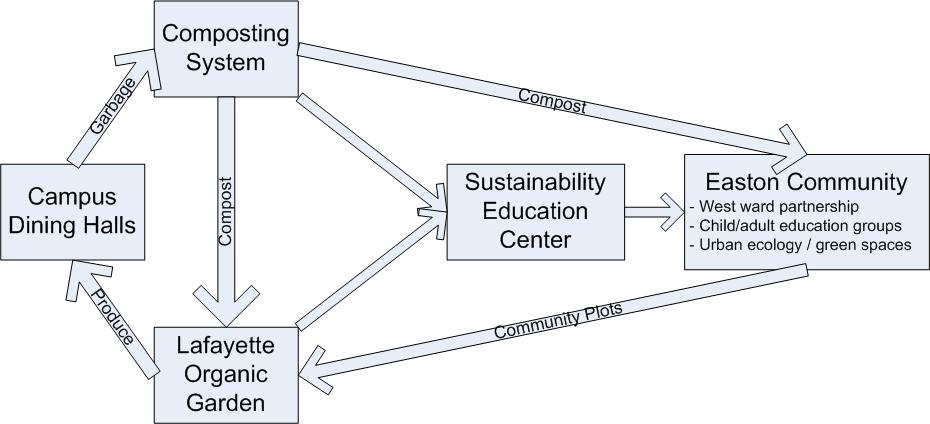We have been awarded $10,000 for Phase 1 of the US EPA’s “People, Prosperity, and the Planet” sustainable design contest. We envision the garden as a part of a sustainable food loop at Lafayette, and the site at Metzgar Fields will one day be part of a large sustainability education center. We will be attending the P3 Expo this April and hopefully be awarded money for Phase 2 of the sustainable design contest.
The three major components of the Phase 1 proposal are as summarized below:
- Sustainable Food Loop. The composting project and the community garden project will be tied together as part of a sustainable food loop. This represents an innovative approach to the idea of recycling and efficient, cradle-to-cradle materials usage.
- Sustainability Education Center. The site at Metzgar Fields will be developed into a hands-on center for the study of different aspects of sustainability. The community garden and composting project will be the central components of this center, but it will also include wetlands, native ecosystem habitats, environmental monitoring equipment, alternative energy technology, etc.
- Community Connections. The project will have numerous benefits for community members and college-community relations. The composting and gardening projects will work with organizations in the Lehigh Valley that are promoting community gardens, urban ecology, and similar initiatives. The Sustainability Education Center will serve as an educational extension for school groups, adult education classes, and other groups interested in environmental issues.
Below is a diagram that shows the flow of materials and ideas throughout the food loop we are working to create. Diagram courtesy of Michael Adelman (’10)
* Phase 2 Proposal Summary:
The main goal of the Phase II project is to create an online dashboard system, Ecospace, which will serve as a database and educational tool for sustainability initiatives. Ecospace will be Internet based and allow data to be uploaded and manipulated from institutions throughout the nation and perhaps around the world. This data will be presented on the website in an interactive manner to allow information from the different institutions to be visualized, compared and analyzed by users of all ages and scientific backgrounds. For instance, users will be able to determine and compare energy, carbon and cost savings for different food loops and parts of these systems. To further facilitate informational exchange, the site will include information about environmental science and the relationship of science to the different sustainability practices; it will also have blogging capabilities. By providing this information, we hope to encourage individuals to incorporate sustainable routines in their everyday lives.
Ecospace will have a hierarchical structure consisting of a front page with basic statistics reflecting the combined operation of all food loops registered in the system, with links to pages for each individual food loop. The data will be structured so that site users can browse through the basic statistics and obtain progressively more detailed data regarding specific organizations or specific processes in the food loop. An additional section of the website will feature a general guide and a forum on initiating and expanding food loop programs, so that participating organizations can share experiences and lessons learned from their own programs. In this way, Ecospace will provide a successful blueprint for new institutions and organizations to begin their own food loop, composting, and other sustainability initiatives. To effectively accomplish these goals, an innovative model which makes it easy for participating organizations to input their food loop data and can display data from a variety of sources in a format that is intuitive and easy to follow will be created.
Real-time data will be gathered from various processes in the food loop and uploaded to Ecospace. We plan to add inline sensors to the composting system to monitor the weight, pH and temperature of the compost. At the community garden, fresh produce will be processed at a weigh station and logged to provide data on the productivity of the garden. We expect that the user will be able to determine the cost, energy and carbon savings to Lafayette College by following the food cycle from garden to dining hall to compost facility and back to the garden.
As in Phase I, education will be a priority for this project. Three touch screen kiosks which will be prominently placed on the Lafayette campus will continuously display the Ecospace website. In addition, we will continue with presentations intended to inform the Lafayette community about the project. We also plan to incorporate Ecospace into our children’s education programs. Finally, the project will be incorporated into a computer science class and an engineering studies class, thus significantly expanding the number of students directly involved in the project.
**For our phase 2 portion of this project, please check out this website: (coming VERY soon!)


